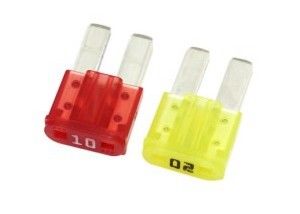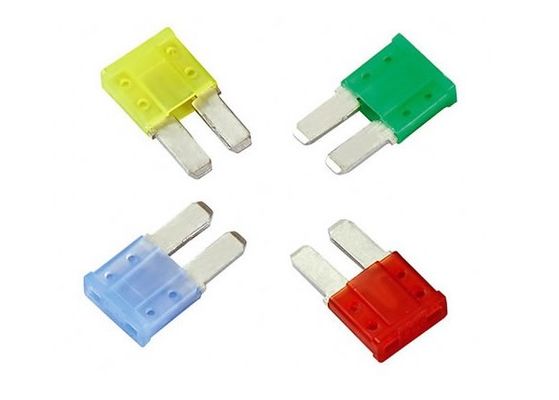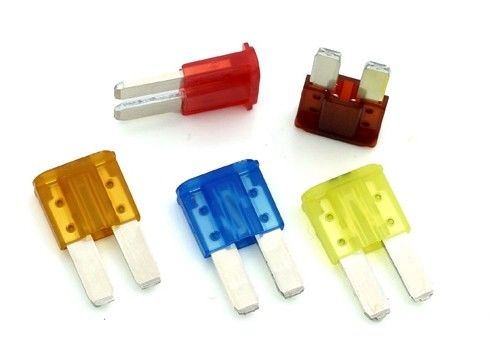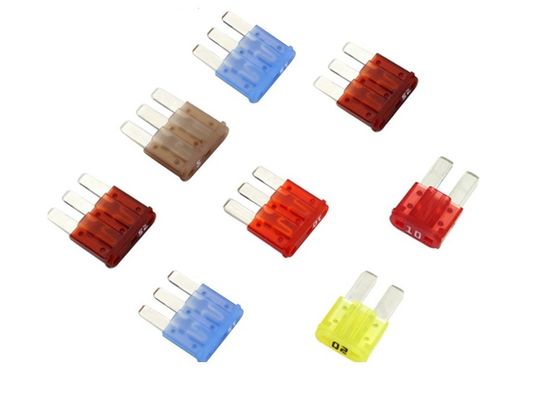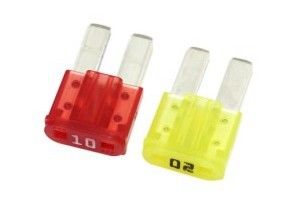32V 10A Low Profile Micro Fuse , 2 Pin Mini Blade Fuses For Cars
Product Details:
| Place of Origin: | CHINA |
| Model Number: | BFSL 10A |
Payment & Shipping Terms:
| Minimum Order Quantity: | 1000PCS |
|---|---|
| Price: | Contact us please |
| Packaging Details: | Bulk |
| Delivery Time: | 1-2 Weeks |
| Payment Terms: | T/T |
| Supply Ability: | 1,000,000 PCS Monthly |
|
Detail Information |
|||
| Fuse Type: | Automotive Blade Fuse | Pin: | 2 Pin |
|---|---|---|---|
| Terminal: | Radial | Voltage: | 32VDC |
| Rated Current: | 10A | Breaking Capacity: | 1KA |
| Color: | Red | Blade Size: | Mini |
| Highlight: | 32VDC low profile micro fuse,2 Pin low profile micro fuse,32V mini blade fuses for cars |
||
Product Description
Narrow Foot Insert Insurance Ultra-small Automotive Blade Fuses 32V 10A Red For Ford Tap Adapter Mini Blade Fuse Holder
Description
This state-of-the-art blade fuse was realized by reducing the width of the BFMN Blade Fuse to offer space reduction
♦ Equivalent to ATO and ATC fuses
♦ Voltage rating of 32Vdc
♦ Used for low voltage applications
Time-Current Characteristics
| % of Ampere Rating(A) | Operating Time | |
| MIN | MAX | |
| 110% | 100 hrs. | - |
| 135% | 0.75 sec. | 120 sec. |
| 160% | 0.25 sec. | 50 sec. |
| 200% | 0.15 sec. | 5 sec. |
| 350% | 0.04 sec. | 0.5 sec. |
| 600% | 0.02 sec. | 0.1 sec. |
Electrical Performances
| Ampere Rating(A) | Part Number | Housing Colors | Resistance Value | Voltage Drop |
| 5A | 1173 | Tan | 17.3 mΩ | 117 mV |
| 7.5A | 1174 | Brown | 10.7 mΩ | 109 mV |
| 10A | 1175 | Red | 7.85 mΩ | 104 mV |
| 15A | 1176 | Blue | 5.05 mΩ | 100 mV |
| 20A | 1177 | Yellow | 3.65 mΩ | 95 mV |
| 25A | 1178 | White(natural) | 2.75 mΩ | 88 mV |
| 30A | 1179 | Green | 2.18 mΩ | 82 mV |
Dimension (mm)
![]()
Time-Current Characteristics Curve
![]()
How Wires, Fuses, and Connectors Work
The main job of the fuse is to protect the wiring. Fuses should be sized and located to protect the wire they are connected to. If a device like your car radiosuddenly draws enough current to blow the fuse, the radio is probably already toast. The fuse is there to protect the wire, which would be much harder to replace than the radio.
Most cars have two fuse panels. The one in the engine compartment holds the fuses for devices like the cooling fans, the anti-lock brake pump and the engine control unit -- all of which are located in the engine compartment. Another fuse panel, usually located in the dashboard near the driver's knees, holds fuses for the devices and switches located in the passenger compartment.
![]()
Interior fuse panel
We saw in the last section how the heat build-up in the wire depends on the resistance and the amount of current flowing through the wire. Fuses are really just a special type of wire in a self-contained connector. Most automotive fuses today have two blade connectors and a plastic housing that contains the conductor. There are also some fuses that are in the wiring of the car, called fusible links.
The conductor inside the fuse is made of a metal similar to solder. It has a lower melting point than the wire itself. The size of the conductor is calibrated very carefully so that when the rated current is reached, enough heat is generated to melt the conductor and so break the circuit.
When a fuse is blown, it must be replaced before the circuit will work. A blown fuse must be replaced with a fuse of the same amperage.
Checking Fuses
The most foolproof way to check a fuse is to pull it out of its receptacle and hook up a continuity tester to both blades of the fuse. But if you do this while the fuse is plugged in, you could get continuity through a path other than the fuse (for instance, both sides of the wire may be grounded when you check the fuse). You can usually tell if a fuse is blown by a visual inspection:




